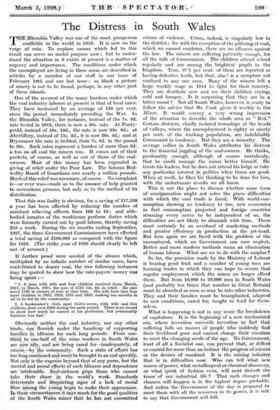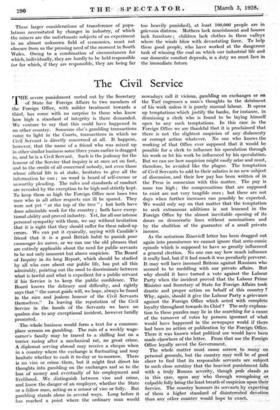The Distress in South Wales T ELE Rhondda. Valley was one
of the most, prosperous coalfields. in the world in X913. It is now on the verge of ruin. . To explore causes which led to this result can serve no useful purpose now ; but to under- stand the ;situation as it exists at present is a matter of urgency and importance. The conditions under which the unemployed are living in these areas are described in articles by a member of our staff in our issue of February 18th and our last issue : so black a picture of misery is not to be found, perhaps, in any other part of these islands. _ . .
One of the severest of the many burdens under which the coal industry labours at present is that of local rates. They have increased by an average of 150 per cent. since the period immediately preceding the War.. III the, Rhondda Valley, for instance, instead of. the 7s. 9d. rate levied.* 1918,:there is now a 30s. rate. At Ponty- pridd,Anstead of 10s. 10d., the rate is now 29s. 6d.; at Abertillery, instead of 11s. 2d., it is now 26s. 4d.; and at Brynmawr the rate .is trebled, from 7s. 6d. in the pound to 30s. Such rates represent a. burden of more than. 6d. a ton on all coal the miners win. It comes put of their, pockets, of course, as well as out of those of the coal- owners. Most of this money has been expended in giving of relief under the Poor Law. The famous Bed- wellty Board of Guardians owe nearly a million pounds. Much of this relief was necessary, of course. No complaint is—or ever was--.–made as to the amount of help granted to necessitous persons, but only as to the method of its distribution.
That this. was faulty is obvious, for a saving of £17,550 .a year has been effected by reducing the number of :assistant relieving •officers from 103 to 13 ; and able- bodied inmates of the workhouse perform duties which were formerly carried out by paid labour, thereby saving 165 a week. During the six months ending September,. 1927,-the three Government Commissioners have effected a total saving of £100,000 as compared with 'the figure for 1925. (The strike year of. 1926 should clearly be left out of account.) If further proof were needed of the abuses which, multiplied by an infinite number of similar cases, have contributed- to dearer coal, the two following instances may be quoted to show how the rate-payers' money was being spent " A Min with wife and four children received from March, :1921, -to March, 1927, the sum of i725-12s. 9d. in relief. He also owed £100 in arreari,of rent at that time. His wife bore him four ! more childieri in 1922, 1923; 1925 and 1926, making ten mouths in all to be fed by the -comnuMity. - 2. A bookmaker's clerk, aged thirty-seven, with wife and five children, drew over £600 during the same period. There is no record. to oho* how much' he earned at his profession; but presumably business was bad." ' Obviously neither the coal indury, nor any other .h • h c st • _ trade, can flourish under the handicap of supporting families _in:idleness for such long periods. From one- third to one-half of the mine workers in South Wilea are new idle, and_ are being eared for—inadequately, of couriby Ihe community: Such a state of affair's' has too long continued and must be brought to an end speedily: Not only is the expense beyond of any purse, but the mental and moral effects of such idleness and dependence are 'intolerable. Soul-sickness grips those Who cannot take their share—in the world's work. Standards deteriorate and disquieting signs of a lack of more) fibre among the young begin to make their appearance. In these circumstances it says much for the good qualities of the South Wales miner that he has not committed crimes of violence. Crime, indeed, is singularly, low in the district ; for with the exception of the pilfering of coal, which we cannot condemn, there are no offences against the law. The miners are suffering patiently enough, for all the talk of Communism. The children attend school regularly and are among the brightest pupils in the kingdom. True, 97-1 per cent. of them are reported as having defective teeth, but that, alas ! is a symptom not confined to any one area. Many of the miners left large weekly wage in 1914 to fight for their country. They are. destitute now and see their children erying,,... cold and hungry. Is it surprising that -they; are in a bitter mood ? Not all. South Wales, however, is ready to follow the advice that Mr. Cook gives it weekly in the Miner. It would convey a, very wrong 'impression of the situation to describe the whole area os" Red." Certain districts, chiefly isolated _townships at the heads of valleys, where the unemployment is eighty or ninety' per cent of the working population, are indubitably Conimunist in tendency.. But they are a minority. the average collier in South Wales attributes his distress to the financial juggling of the coal-owners. He thinks, pardonably enough, although of course mistakenly, that he could manage the mines 'better himself.' lie trusts his leaders, but he does not attend his lodge or take any particular interest. in politics when times are good.When at work, he likeS his thinking to be done for hini, with the unfortunate results we all know.
This is not the place to discus's whether some form: of amalgamation might not solve the grave difficulties with which the coal trade is faced. With world-con: sumption showing no tendency to rise, new economies in fuel consumption projected and foreign countries straining every nerve to be independent of us, the difficulties are not likely to diminish with time. There must certainly be an overhaul of marketing methods and greater efficiency in production at the pit-head.
But here again we are faced with the problem of the unemployed, which no Government can now neglect. Better and more modern methods mean an elimination of human labour. What are we by do with the surplus ? So far, the provision made by the Ministry of Labour. is bearing good fruit and a number of yOung men are learning trades in which they can hope to secure that regular employment which the mines no longer afford them. But from 10,000 to 20,000 Men in South Wales (and probably ten times that number in Great Britain) must be absorbed as soon as may be into Other industries. They and their families must be transPlanted; adapted to new conditions, cared for, taught to fend for theni seiveS.
What is happening is not in any sense the breakdown of capitalism. It is the 'beginning of a new mechanized era, where invention succeeds invention se, fast that' suffering falls on masses Of people who 'Suddenly find' their livelihood gone and cannot ,change their' Vocatian to meet the changing need.; of the age. 'NO G(SYernment, least of all a Socialist one, can prevent that, or dated or control for more than an instant the progress of serenee or the desires of Mankind: It Is the •mining industiq that is in' difficulties now' Who 'can tell' *hat 'new source Of power; what metalhirgical or cheraitaidiscovery, or what quirk -of fashion -even; *ill' hat' disturb the' tenor. of our' induitrial lifer? 'That such changes and chanceS will hipped is in the ' higheat degree probable. And unless the Goverrimerit of the day is prepared to meet therm with all the resinfives in its power, it is safe- to say that Government will fall. These larger considerations of transference of popu- lations necessitated by changes in industry, of which the miners are the unfortunate subjects of an experiment in 'an almost unknown field of economics, must not obscure from us the pressing need of the moment in South Wales. Owing to a combination of circumstances for which, individually, they are hardly to be held responsible (or. for which, if they are responsible, they arc being far too heavily punished), at least 100,000 people are in grievous distress: Mothers lack nourishment and houses lack furniture ; children lack clothes in these valleys where the winds blow with devastating force. To help these good people, who have worked at the dangerous task of winning the coal on which our industrial life and our domestic comfort depends, is a duty we must face in the immediate future































































 Previous page
Previous page